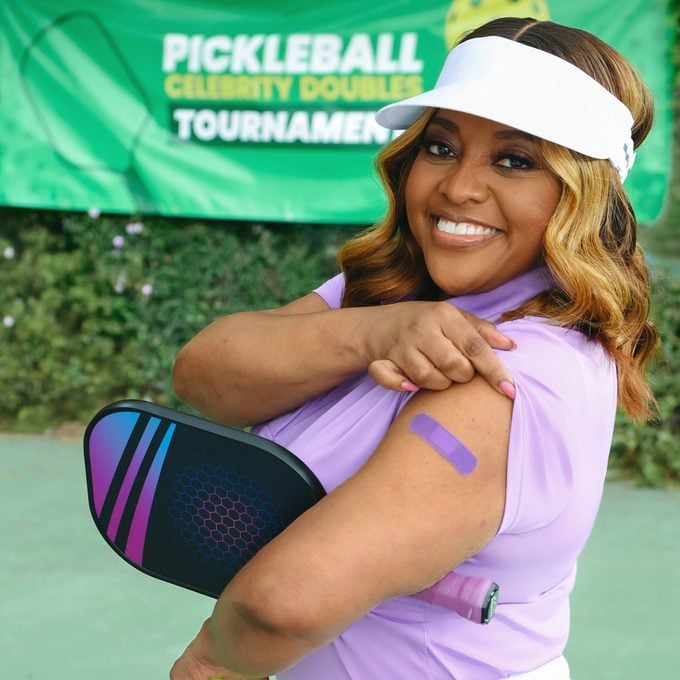Sherri Shepherd Is Hustling To Help Reduce Cases of This Disease
Updated: Feb. 05, 2024

Plus, the beloved talk TV personality shares her inspiring take as a patient managing the lifestyle disease affecting 40 million Americans: "It can open up another world for you."
Sherri Shepherd says for the 25 years Oprah was on, she barely missed an episode. So when Oprah recently announced that she was passing the talk show baton onto the Emmy-nominated host of Sherri and former co-host of The View, Sherri tells us it felt like her whole life had gone full circle. At a time when I was in a physically abusive relationship, you & your show gave me the strength to walk away, Shepherd wrote on Instagram. Watching you everyday made me believe that someday I could have my own talk show. Watching you be vulnerable made it okay for me to share my anxieties in front of people. The way you deal with life’s adversities make me know I can be triumphant in my own.
Oprah also inspired Shepherd to use her platform to help others. As one example, Shepherd has partnered with Pfizer to raise awareness about pneumococcal pneumonia. Shepherd also advocates for awareness around type 2-diabetes, a disease she’s lived with and spoken about about for over a decade since co-writing the book, “Plan D: How to Lose Weight and Beat Diabetes” in 2013.
Approximately 38 million Americans live with diabetes, which puts patients at more than four times a greater risk of getting pneumococcal pneumonia compared to healthy adults, according to Pfizer. This is why Shepherd is passionate to spread the word about pneumococcal pneumonia vaccination through the This Is Your Shot initiative.
This week, Sherri Shepherd sat down with The Healthy by Readers Digest to share her out-of-the-box take on living with diabetes, the Oprah effect…and what she thinks about Ozempic.

The Healthy by Readers Digest: Diabetes is an issue you’ve cared about for a long time. Can you tell us a little bit about your own journey?
Sherri Shepherd: I was first diagnosed with diabetes back in about 2007, but prior to that, I was always told that I was pre-diabetic. My thing was, “Well, what does that mean? Can I still eat what I’m going to eat?”
The doctors told me, “No, you have to modify what you’re going to eat so that you won’t get diabetes.”
I didn’t want to deal with anything at the time—and then no surprise, I got diabetes. I had a very loving doctor who did a lot of tough love with me and let me know all of the horrible things that could happen if I kept going down the path. From there I did a lot of research on diabetes, and I really worked on changing my lifestyle and exercising more. I was on medication, Metformin, for my diabetes, and just through the years, I learned more and more about lifestyle and exercise and eating what I need.
The Healthy: Were there any symptoms that initially brought you to the doctor?
Sherri Shepherd: Yes! I was going to the bathroom nonstop. I was getting the tingles in my fingers in my toes, numbness, then just tingling. My eyesight was very blurry. It was very hard to concentrate. And then I just was foggy after I ate my favorite meal, which was pesto pasta. My glucose levels were just going sky high.
The Healthy: Can you share a little about how you changed your diet and nutrition?
Sherri Shepherd: I had to re-learn the way I look at food, and I had to learn to look at labels. I had to learn, Oh wow, this has a lot of carbs, which converts into sugar, and pasta is not the best thing for me. Maple syrup, drenching my pancakes isn’t the best thing for me.
I had to learn about substitutions—I was a big sweet eater, and cookies. I had to learn things like, Wow, if you do celery with some almond butter, you can fulfill a little bit of your sweet tooth instead of going to eat Hershey’s Kisses. I learned how more protein in my diet is better. So just the eating part, it was a whole new world for me. I never had squash before, and then I got diabetes. I was like, Well, what is this thing called squash?
The Healthy: Amazing. What do you do for physical activity?
Sherri Shepherd: I’m really into heavy weightlifting because I have found out as I get more seasoned—I don’t say “older,” more seasoned—weightlifting is just better for my body. It gives me more energy.
The Healthy: What are your thoughts on Ozempic?
Sherri Shepherd: I have been in the gym so much and really working on eating right so much. So for me, it’s just a healthy thing. It’s not like I’m trying to lose weight. I just want to be as healthy as I can be.
The Healthy: Has a lot changed since you wrote the book in 2013 in terms of how to manage and take care of type two diabetes?
Sherri Shepherd: I’ve learned to forgive myself even more because as human beings we go through ups and downs, and for the most part I am able to manage the ups and downs. I have learned to really say, “Sherri, you are doing the best that you can.” If I look at one more TikTok video about the collagen I’m supposed to take, it’s very overwhelming and you have to just say, “It’s OK. Let me just try one new thing and see how this works.”
New Research: Eating More of These Carbs May Actually Lower Weight and Diabetes Risk
The Healthy: What’s one healthcare ritual you refuse to skip?
Sherri Shepherd: I’ve changed my speech. That’s a big one: Changing the way I speak. I used to always say, “Oh, I hate going to the gym.” Now, my clock rings at 4:45 a.m. and I don’t hit the snooze button. I pop up and I go, “I get to go to the gym. This is the one way I can show me some love and attention.” Because if you keep saying you’re tired, you’re going to be tired.
The Healthy: Great attitude. You’ve partnered with Pfizer to raise awareness about the risks of pneumonia. Could you tell me a little bit about the partnership, and what you hope fellow diabetes patients will understand?
Sherri Shepherd: As a Black woman, we’re 60% more likely to be diagnosed with diabetes than white Americans. So that’s a big number, and with that number being so big, I really wanted to encourage my community to learn if they are at risk for pneumococcal pneumonia. Being a woman in my fifties and being diabetic, I am at a greater risk of getting pneumococcal pneumonia compared to healthy adults who are in the same age range as me. That concerned me, especially because I just was sick a week ago and I got a really bad cold.
The one thing that I was so happy about was that I had taken my shot for pneumococcal pneumonia, and I knew that that was something that would help prevent me from getting pneumococcal pneumonia.
The Healthy: You recently had Oprah on your talk show and she said you’re the TV host to watch. What was that like to hear?
Sherri Shepherd: That was just a surreal moment because I was on Oprah’s show in the audience when I was 23 years old, and I used to dream even then about, Wow, could I have my own talk show one day? And looking at someone like Oprah, who looked like me, who her hair was like mine, we were from the same city. I thought to myself, Maybe I can.
I held onto that for 32 years of getting a lot of no’s, pitching my own show, and finally when this dream just came true, and for Oprah to contact me and give me advice and I could call her and text her and go, “I need you to help me,” and knowing she was there and knowing that she turned down other talk shows to come on my talk show: That was a big deal. So it was just full circle for me. I was so happy. I still am.

The Healthy: It was powerful to read on Instagram what you shared about her having such an impact on you, giving you strength to walk away from an abusive relationship.
Sherri Shepherd: Oprah was must-see viewing. I watched Oprah every day. I don’t think I missed any episodes. And Oprah, just her vulnerability, she would tell you when she was going through stuff, she addressed it. It made me feel like she was real. I learned that from Oprah.
We underestimate how much our platform can inspire people or encourage people. And so the way Oprah used her platform is the way I like to use mine as well, to let people know life is not over. If you get diabetes, as a matter of fact, it can open up another world for you of eating better, and living a healthier lifestyle. You don’t have to be scared.












